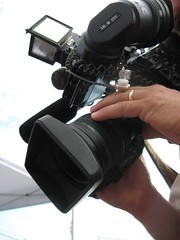
The one-person band model re-invented for today's larger TV news operations continues to prove my graduate research predictions from 1995 at KU that the one-person man model would continue to grow into major markets. Now WUSA in Washington, D.C. is adopting the model. I remember working for WBOY as a one-man band in the 80s and while covering a local story playing out in D.C. and how the big city news crews treated me like some stray dog to be kicked to feared. The world is changing!
From the Washington Post:
by Paul Fahri
WUSA moves to one-person news crews
The march of technology and the shrinking economy are beginning to take a toll on the traditional means of television news-gathering: the TV news crew.
Under a new agreement reached this week with its labor unions, WUSA, Channel 9, will become the first station in Washington to replace its crews with one-person "multimedia journalists" who will shoot and edit news stories single-handedly.
The change will blur the distinctions between the station's reporters and its camera and production people. Reporters will soon be shooting and editing their own stories, and camera people will be doing the work of reporters, occasionally appearing on the air or on in video clips on Channel 9's Web site.
For decades, TV journalists have worked in teams, with the lines of responsibility regulated by union rules or simple tradition. Stories were covered by a crew consisting of a camera operator and a correspondent (and further back, by a sound or lighting technician); their work was overseen by a producer and their footage assembled into a finished story by an editor.
ad_icon
But technology -- handheld or tripod-mounted cameras, laptop editing programs and the Internet -- have made it possible for one person to handle all those assignments, station managers say.
The change is driven by increasing financial pressure on TV stations, as advertisers disappear from nightly newscasts and audiences scatter to the growing number of channels and Web sites.
In fact, separate from its new union agreement, WUSA -- owned by McLean-based media giant Gannett -- plans an across-the-board cut in reporters' salaries as it increases their responsibilities. Multimedia journalists will earn 30 to 50 percent less than what traditional reporters have been earning, with salaries topping out at around $90,000 annually, according to people at the station.
Channel 9 -- which is running last in the local news ratings -- will switch to the new system early next year, becoming the first station in a major market to revamp its entire newsroom. Its agreement is with the American Federation of Television and Radio Artists, which represents on-air reporters, and the International Brotherhood of Electrical Workers, which represents production employees. Union members said they expect the agreement to be ratified.
Competitors are paying close attention. Another Washington station, WRC, Channel 4, is expected to begin phasing multimedia journalists into its newsroom later next year as part of a sweeping cost-cutting effort by its parent, NBC Universal. WJLA, Channel 7, has already used some of the work of multimedia reporters employed by NewsChannel 8, the cable station that is owned by the parent of WJLA, Allbritton Communications. A fourth local news station, WTTG, Channel 5, said it has no immediate plans to do something similar.
"We believe strongly that [this change] will raise both the quality and quantity of the product we're putting out" on TV and on the internet, said Allan Horlick, the president and general manager of WUSA, in an interview yesterday. "The concept of a multimedia journalist, having his own beat, with an area of expertise, and a limitless virtual news desk is something we can get very excited about."
However, the concept gets mixed reviews in other quarters. Veteran TV journalists say their concern isn't the quantity of news that can be produced but the quality, because not all TV journalists are skilled enough to do a job formerly handled by specialists.
"There are some people who will be very good at this, and some not as much," said Bill Lord, WJLA's news director. "If you're forcing everyone to do things against their skill levels and desire, your product suffers."
The newspaper industry has experimented with something similar -- using "mobile journalists" or "mo-jos" to report and write articles and take video and photographs, which they upload to their newspapers' Web sites.
The upcoming changes at WUSA have soured veteran reporter Gary Reels, who began working at the station in 1980. Reels has decided to take a buyout offer from the station and will leave Dec. 23. He doesn't know yet what he'll be doing next.
"It takes a lot of time to shoot and edit and write and prepare a story, and if you have one person doing all that, something has to give," he said yesterday. "For those people who want to take the challenge of adding all that to their workload, my hat's off to them. But it's not something at my ripe old age that I care to venture into."